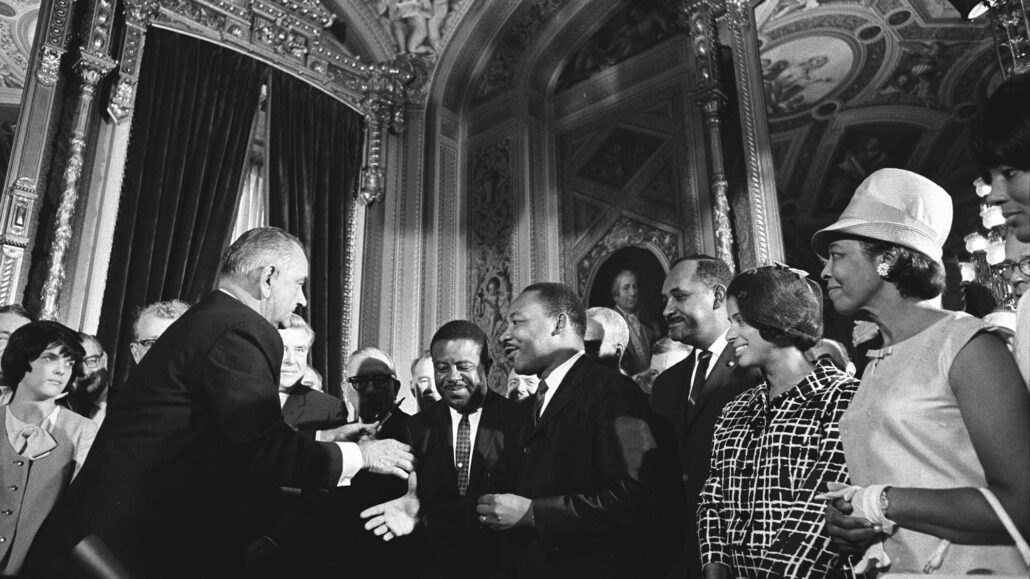By D. Kevin McNeir
On March15, 1965, a week after Bloody Sunday, President Johnson delivered a nationwide address in which he declared that “all Americans must have the privileges of citizenship regardless of race.” Johnson informed the nation that he was sending a new voting rights bill to Congress, and he urged Congress to vote the bill into law. Congress complied, and President Johnson signed the Voting Rights Act of 1965 on August 6, 1965.
The impact of the bill
The bill outlawed poll taxes, literacy tests and other practices that had effectively prevented southern blacks from voting. It authorized the U.S. attorney general to send federal officials to the South to register black voters in the event that local registrars did not comply with the law, and it also authorized the federal government to supervise elections in districts that had disfranchised African Americans. The Voting Rights Act of 1965 transformed patterns of political power in the South. By the middle of 1966, over half a million Southern blacks had registered to vote, and by 1968, almost 400 black people had been elected to office.
As African Americans joined the Democratic Party, many white southerners began to defect to the Republicans. With African Americans voting en masse, some Southern Democrats, like George Wallace, began to shed their segregationist rhetoric and attempt to appeal to black voters. At the federal level, President Johnson appointed the first black cabinet member, Robert C. Weaver, as head of the Department of Housing and Urban Development. In 1967, he appointed Thurgood Marshall as the first African American justice of the Supreme Court.
But while African Americans may have believed that the war over equal voting rights had finally come to an end, it would soon become apparent that more battles would be required as their victory was short lived.
Supreme Court halts use of key part of voting law
In July 2013, a deeply divided U.S. Supreme Court gutted the Voting Rights Act in Shelby County v. Holder, throwing out the most powerful part of the landmark Voting Rights Act. The court argued in part that it is arbitrary and no longer necessary to focus exclusively on the former Confederacy, the Court’s majority eliminated the pre-clearance requirement for nine Southern states.
The result: the Justice Department could no longer check for racial bias in new laws in these states. It was a decision celebrated by mostly Southern states after being freed from nearly 50 years of intense federal oversight of their elections. The justices, split along partisan and ideological lines, voted 5-4 to strip the government of its most potent tool to stop voting bias — the requirement in the Voting Rights Act that all or parts of 15 states with a history of discrimination in voting, mainly in the South, get Washington’s approval before changing the way they hold elections.
Chief Justice John Roberts, writing for a majority of conservative, Republican-appointed justices, said the law’s provision that determines which states are covered is unconstitutional because it relies on 40-year-old data and does not account for racial progress and other changes in U.S. society.
The decision effectively put an end to the advance approval requirement that had been used to open polling places to minority voters in the nearly half century since it was first enacted in 1965, unless Congress could come up with a new formula that Roberts said meets “current conditions” in the United States.
More than a decade later, the ruling continues to reverberate across the country as Republican-led states pass voting restrictions that, in several cases, would have been subject to federal review had the conservative-leaning court left the provision intact. At the same time, the justices have continued to take other cases challenging elements of the landmark 1965 law that took shape out of the often violent struggle for African Americans’ right to vote. At least 104 restrictive voting laws have passed in 33 mostly GOP-controlled states since the 2020 election, according to an analysis by the Voting Rights Lab, which tracks voting legislation in the states.
What the textbooks fail to include
It is tempting to think of universal voting rights as a fundamental pillar of our country, but access to the vote has been hard fought and even today we face challenges and rollbacks. Although voting rights have always been essential, they are not a given and do not alone secure equality. The struggle for civil and human rights for all must continue. The untold history of the VRA can inform and strengthen that struggle.
Long before the Voting Rights Act, Reconstruction launched another vibrant period of democracy and voting rights; black voting rights have been attached and rolled back throughout our history; from the end of Reconstruction through the passage of the 1965 Voting Rights Act, white supremacists used numerous tactics to keep African Americans from accessing their constitutional right to vote; the federal government has played a contradictory role in the fight for voting rights; SNCC upended traditional ideas about who was qualified to vote; and federal protection for voting rights is still necessary.
That’s right: federal protection for voting rights remains necessary.


